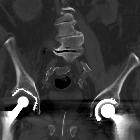vacuum phenomenon
















Vacuum phenomena describe aseptic gas collections (e.g. nitrogen and traces of oxygen and or carbon dioxide) within different specific tissues . Usually, they are seen within the intervertebral discs, the bones and within different joints, but can also be seen in other usually adjacent locations due to migration.
Epidemiology
Frequency of occurrence depends largely on the location and tissue involved. It is quite common within the intervertebral discs of the elderly, where it can reach a prevalence of up to 20% and it has been seen with an incidence of up to 8.6% in frog-leg-lateral radiographs in normal children .
Vacuum phenomena can be physiological or within the scope of pathological processes.
They can be classified according to their location as intradiscal, intraosseous, intra-articular and other tissues .
Physiological vacuum phenomena can occur and are quite frequently seen in the intervertebral disc within the scope of aging, or in any joint where distractive forces or a wide range of movement are involved including the glenohumeral, acromioclavicular, sternoclavicular, sacroiliac, hip, knee, ankle, wrist or temporomandibular joints .
Clinical presentation
There are no specific clinical symptoms unless they are associated with rare specific complications e.g. pneumatic nerve root compression.
Pathology
They can be associated with different musculoskeletal pathologies, especially traumatic fractures and dislocations as well as insufficiency fractures and osteonecrosis, in particular with:
- progressive intervertebral disc degeneration, and lumbar spinal stenosis
- increased spinal instability, when found in facet joints
- spinal wedge compression fractures
- fractures
- dislocations
- fracture non-union
- Legg-Calvé-Perthes or Panner disease
- femoroacetabular impingement
Vacuum phenomena can also migrate into adjacent structures of a disc, joint or bone and can then be found for example within the epidural space, where they have been reported to lead to pneumatic nerve root compression or in a sleeve of a nerve due to nerve root avulsion .
Radiographic features
Appearance and signal characteristics are those of air will be seen as radiolucency on a radiograph and as an air inclusion on CT.
MRI
Vacuum phenomena are of low signal in both T1 and T2.
Differential diagnosis
- soft tissue emphysema
- septic air bubble formations or abscesses
- iatrogenic or traumatic intra-articular gas
See also
- intervertebral disc vacuum phenomenon
- facet joint vacuum phenomenon
- pneumatic nerve root compression
- vacuum phenomenon in the shoulder
- intra-articular gas
Siehe auch:
- Vakuumphänomen im Wirbelkörper
- Vakuumphänomen Schultergelenk
- intervertebral disc vacuum phenomenon
- Pneumarthros
- Osteochondrosis intervertebralis
- intraossäres Vakuumphänomen
- vacuum phenomena in carpus
und weiter:

 Assoziationen und Differentialdiagnosen zu Vakuumphänomen:
Assoziationen und Differentialdiagnosen zu Vakuumphänomen:


